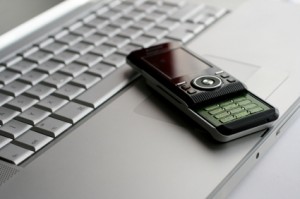Did you know that the average American receives 41 pounds of junk mail every year? If you can reduce the volume of junk mail you receive, you and the environment will benefit. The less junk mail you receive, the less time you have to waste sorting through unessential communications and the more time you will have to focus on what is truly important to you. When I lived in Switzerland, people would put stickers on their mail box with the statement “Bitte, keine reklame!” (meaning, “Please, no advertisements!”). The postal worker could not then put sales circulars, catalogs or other unsolicited junk mail in the post boxes so marked. Such mail would be returned to the sender at his expense. I hope that we can soon pass legislation in the U.S. providing such consumer protections. Meanwhile, there are steps that you can take to reduce your volume of junk mail. The Center for a New American Dream even offers a kit to do it for you, or you can sign up for Catalog Choice to opt out of mailers. In Prepare for the Worst, Plan for the Best: Disaster Preparedness and Recovery for Small Businesses (Wiley, second edition, 2008), I offer some suggestions to contact credit card companies and mailing list providers to substantially reduce the volume of unwanted mail you receive. It is bad enough receiving junk mail in your office during normal business operations, but this is certainly a burden you don’t want to have should you find yourself displaced and temporarily operating from a remote location in the event of a disaster.
Archive for February, 2009
How to Lose 41 Pounds Without Cutting Calories
Friday, February 13th, 2009Dial “C” for Caution
Thursday, February 12th, 2009We are all sensitive to the need to protect confidential business data on our laptop computers, but have you given any thought to what is stored on your cell phone? Just a few weeks ago a man in New Zealand paid $10 for a used MP3 player and found it preloaded with U.S. military records and personnel data for troops stationed in the Middle East. In December, an old BlackBerry was sold for $20 at a garage sale of the McCain Presidential Campaign. It was found to be preloaded with sensitive Republican donor information, emails, and more. Unfortunately, incidents such as these, while embarrassing, are all too common. Don’t let them happen at your small business.
Regenersis processed over two million mobile phone handsets in 2008 and last December, during a random sampling of 2,000 recycled mobile phones, found that 99% of them stored sensitive data such as banking information and confidential e-mail messages. The average mobile phone is replaced every 18 months; if you do not clear these handsets of data before you recycle or dispose of them, you may jeopardize the security of your small business. Of course, not all cell phones are recycled or donated once they are removed from service. In the U.S., over 700 million cell phones that are no longer actively used are stockpiled in homes or businesses, which also pose security risks.
Do not rely on the next user or the cell phone recycling firm to purge your data for you. It is safer to invest a minute or two to learn how to do a proper factory reset/hard reset on your phone, remove memory and/or SIM cards, check to make sure everything’s been wiped, and then dispose of your handset.
The High Cost of Discounted Goods
Wednesday, February 11th, 2009In Prepare for the Worst, Plan for the Best: Disaster Preparedness and Recovery for Small Businesses (Wiley, second edition, 2008), I advise readers that it is always best to purchase the current versions of computer hardware for their small businesses. Rarely is it cost-effective to purchase an earlier model of hardware for the reduction in price. Recent discount offerings by major retailers, such as Circuit City, have prompted readers to ask me if I would like to revise my original advice. After all, with major retailers discounting their inventory by 80% in bankruptcy sales, doesn’t this represent a great opportunity for small businesses to save some money on their purchases? The answer is: no, not necessarily. Consider the purchase of a computer printer. The printer’s functionality is dependent of the hardware (the printer itself) and the software (the printer driver which delivers instructions from your computer to the printer). Whenever the computer operating system is upgraded, the manufacturer of the printer must write software for the new printer driver, which they typically make available for free download. Now you see the competing needs of two different business models.
The manufacturers of computer operating systems generate revenues from software licensing fees, which are like an annuity stream. But the hardware manufacturers only earn revenue at the point of sale: when you purchase their printer. If they have to keep writing and distributing new printer driver software every time the operating system is upgraded, they incur open-ended and unlimited costs. They could invest substantial amounts of resources in supporting obsolete hardware to keep up with software upgrades. That is why hardware manufacturers limit their support to a fixed period of time, typically a year or two. So that discounted printer model you purchase at the online auction or the bargain basement may appear inexpensive. But then you attempt to set it up and find that you don’t have a current printer driver to make it work optimally with your computer system. Then the cheap printer becomes an incredibly expensive paperweight. So I am sticking with my original position: it is generally best for small businesses to invest in the current models of computer hardware, irrespective of retailer discounting.
Back From New Orleans
Tuesday, February 10th, 2009I just returned from a very enjoyable few days in New Orleans where I facilitated a “Train the Trainer” day-long workshop for the counselors of the Small Business Development Centers across Louisiana. One of the challenges that was discussed concerned the need to budget for successive evacuations, which FEMA does not reimburse. One of the counselors told me of a client who had to evacuate the Gulf Coast area three times during the 2008 hurricane season at a cost of $1,000 per trip. He does not have the funds available for another evacuation. Another counselor suggested that New Orleans residents should accept the reality of hurricane season as a cost of living in the community and budget some savings for it. If they are not called to evacuate in a given year, they have a Christmas fund with the accumulated savings. Good advice for all of us, no matter where we are located. Liquidity, or the immediate availability of cash, is important for all small businesses, particularly in the current economic environment.
I also had the opportunity to visit some of the community-based non-profits in New Orleans which are laying off staff owing to the downturn in charitable donations that began with the Wall Street crisis of September 2008. On a happier note, I had two excellent dinners with the SBDC team: one at Mr. B’s and one at Bourbon House, both in the French Quarter. (We stayed at the Hotel Monteleone where our program was held.) I recommend both to readers who will travel to New Orleans for Mardi Gras, which will begin on February 24 this year.
The Clock is Ticking
Monday, February 9th, 2009As is sadly the case with longer-term, chronic disaster relief needs, out of sight is often out of mind. According to the Houston Chronicle, donations supporting recovery efforts in the Texas Gulf Coast in the aftermath of Hurricane Ike are dwindling. The United Way of Greater Houston had raised close to $6 million for its hurricane efforts. It has stopped raising funds and is currently focused on longer-term human service needs. The Gulf Coast Ike Fund expects that by March it will have distributed all of the close to $12 million it has raised for emergency and short-term needs and will close its doors. The Bush-Clinton Coastal Recovery Fund is the only remaining entity still actively raising funds; however, its aid assistance focuses on rebuilding public infrastructure, not on the needs of families and small businesses. Charitable giving to support disaster relief efforts for Hurricane Ike was hindered by the timing of the financial crisis, with Lehman Brothers filing for bankruptcy two days after Ike struck the Gulf Coast. With the financial markets in crisis, charitable giving across all sectors has slowed, although the needs remain acute.
To help address these needs, I will be partnering with chapters of the American Red Cross to speak at events at Borders Bookstores in their local communities, with 10% of all sales during those time periods to be donated to the Red Cross. These events will take place in March, National Red Cross Month. As the dates are confirmed, I will post them on this site.




